Guodong Long
Prompt Federated Learning for Weather Forecasting: Toward Foundation Models on Meteorological Data
Jan 22, 2023Abstract:To tackle the global climate challenge, it urgently needs to develop a collaborative platform for comprehensive weather forecasting on large-scale meteorological data. Despite urgency, heterogeneous meteorological sensors across countries and regions, inevitably causing multivariate heterogeneity and data exposure, become the main barrier. This paper develops a foundation model across regions capable of understanding complex meteorological data and providing weather forecasting. To relieve the data exposure concern across regions, a novel federated learning approach has been proposed to collaboratively learn a brand-new spatio-temporal Transformer-based foundation model across participants with heterogeneous meteorological data. Moreover, a novel prompt learning mechanism has been adopted to satisfy low-resourced sensors' communication and computational constraints. The effectiveness of the proposed method has been demonstrated on classical weather forecasting tasks using three meteorological datasets with multivariate time series.
Dual Personalization on Federated Recommendation
Jan 16, 2023Abstract:Federated recommendation is a new Internet service architecture that aims to provide privacy-preserving recommendation services in federated settings. Existing solutions are used to combine distributed recommendation algorithms and privacy-preserving mechanisms. Thus it inherently takes the form of heavyweight models at the server and hinders the deployment of on-device intelligent models to end-users. This paper proposes a novel Personalized Federated Recommendation (PFedRec) framework to learn many user-specific lightweight models to be deployed on smart devices rather than a heavyweight model on a server. Moreover, we propose a new dual personalization mechanism to effectively learn fine-grained personalization on both users and items. The overall learning process is formulated into a unified federated optimization framework. Specifically, unlike previous methods that share exactly the same item embeddings across users in a federated system, dual personalization allows mild finetuning of item embeddings for each user to generate user-specific views for item representations which can be integrated into existing federated recommendation methods to gain improvements immediately. Experiments on multiple benchmark datasets have demonstrated the effectiveness of PFedRec and the dual personalization mechanism. Moreover, we provide visualizations and in-depth analysis of the personalization techniques in item embedding, which shed novel insights on the design of RecSys in federated settings.
Fine-Grained Distillation for Long Document Retrieval
Dec 20, 2022Abstract:Long document retrieval aims to fetch query-relevant documents from a large-scale collection, where knowledge distillation has become de facto to improve a retriever by mimicking a heterogeneous yet powerful cross-encoder. However, in contrast to passages or sentences, retrieval on long documents suffers from the scope hypothesis that a long document may cover multiple topics. This maximizes their structure heterogeneity and poses a granular-mismatch issue, leading to an inferior distillation efficacy. In this work, we propose a new learning framework, fine-grained distillation (FGD), for long-document retrievers. While preserving the conventional dense retrieval paradigm, it first produces global-consistent representations crossing different fine granularity and then applies multi-granular aligned distillation merely during training. In experiments, we evaluate our framework on two long-document retrieval benchmarks, which show state-of-the-art performance.
Federated Learning on Non-IID Graphs via Structural Knowledge Sharing
Nov 23, 2022Abstract:Graph neural networks (GNNs) have shown their superiority in modeling graph data. Owing to the advantages of federated learning, federated graph learning (FGL) enables clients to train strong GNN models in a distributed manner without sharing their private data. A core challenge in federated systems is the non-IID problem, which also widely exists in real-world graph data. For example, local data of clients may come from diverse datasets or even domains, e.g., social networks and molecules, increasing the difficulty for FGL methods to capture commonly shared knowledge and learn a generalized encoder. From real-world graph datasets, we observe that some structural properties are shared by various domains, presenting great potential for sharing structural knowledge in FGL. Inspired by this, we propose FedStar, an FGL framework that extracts and shares the common underlying structure information for inter-graph federated learning tasks. To explicitly extract the structure information rather than encoding them along with the node features, we define structure embeddings and encode them with an independent structure encoder. Then, the structure encoder is shared across clients while the feature-based knowledge is learned in a personalized way, making FedStar capable of capturing more structure-based domain-invariant information and avoiding feature misalignment issues. We perform extensive experiments over both cross-dataset and cross-domain non-IID FGL settings, demonstrating the superiority of FedStar.
CCPrompt: Counterfactual Contrastive Prompt-Tuning for Many-Class Classification
Nov 11, 2022Abstract:With the success of the prompt-tuning paradigm in Natural Language Processing (NLP), various prompt templates have been proposed to further stimulate specific knowledge for serving downstream tasks, e.g., machine translation, text generation, relation extraction, and so on. Existing prompt templates are mainly shared among all training samples with the information of task description. However, training samples are quite diverse. The sharing task description is unable to stimulate the unique task-related information in each training sample, especially for tasks with the finite-label space. To exploit the unique task-related information, we imitate the human decision process which aims to find the contrastive attributes between the objective factual and their potential counterfactuals. Thus, we propose the \textbf{C}ounterfactual \textbf{C}ontrastive \textbf{Prompt}-Tuning (CCPrompt) approach for many-class classification, e.g., relation classification, topic classification, and entity typing. Compared with simple classification tasks, these tasks have more complex finite-label spaces and are more rigorous for prompts. First of all, we prune the finite label space to construct fact-counterfactual pairs. Then, we exploit the contrastive attributes by projecting training instances onto every fact-counterfactual pair. We further set up global prototypes corresponding with all contrastive attributes for selecting valid contrastive attributes as additional tokens in the prompt template. Finally, a simple Siamese representation learning is employed to enhance the robustness of the model. We conduct experiments on relation classification, topic classification, and entity typing tasks in both fully supervised setting and few-shot setting. The results indicate that our model outperforms former baselines.
Unsupervised Knowledge Graph Construction and Event-centric Knowledge Infusion for Scientific NLI
Oct 28, 2022Abstract:With the advance of natural language inference (NLI), a rising demand for NLI is to handle scientific texts. Existing methods depend on pre-trained models (PTM) which lack domain-specific knowledge. To tackle this drawback, we introduce a scientific knowledge graph to generalize PTM to scientific domain. However, existing knowledge graph construction approaches suffer from some drawbacks, i.e., expensive labeled data, failure to apply in other domains, long inference time and difficulty extending to large corpora. Therefore, we propose an unsupervised knowledge graph construction method to build a scientific knowledge graph (SKG) without any labeled data. Moreover, to alleviate noise effect from SKG and complement knowledge in sentences better, we propose an event-centric knowledge infusion method to integrate external knowledge into each event that is a fine-grained semantic unit in sentences. Experimental results show that our method achieves state-of-the-art performance and the effectiveness and reliability of SKG.
Federated Learning from Pre-Trained Models: A Contrastive Learning Approach
Sep 21, 2022
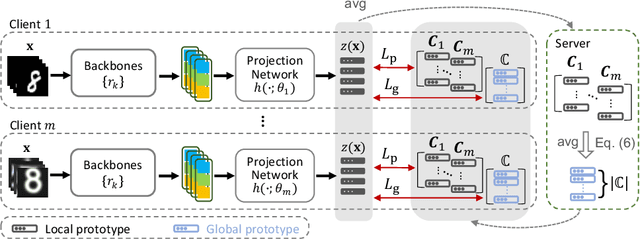
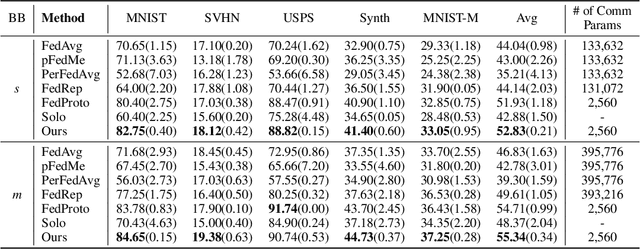
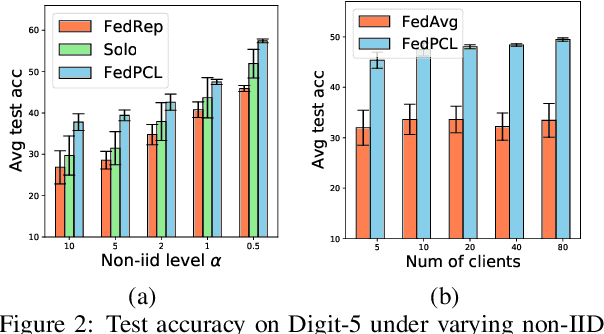
Abstract:Federated Learning (FL) is a machine learning paradigm that allows decentralized clients to learn collaboratively without sharing their private data. However, excessive computation and communication demands pose challenges to current FL frameworks, especially when training large-scale models. To prevent these issues from hindering the deployment of FL systems, we propose a lightweight framework where clients jointly learn to fuse the representations generated by multiple fixed pre-trained models rather than training a large-scale model from scratch. This leads us to a more practical FL problem by considering how to capture more client-specific and class-relevant information from the pre-trained models and jointly improve each client's ability to exploit those off-the-shelf models. In this work, we design a Federated Prototype-wise Contrastive Learning (FedPCL) approach which shares knowledge across clients through their class prototypes and builds client-specific representations in a prototype-wise contrastive manner. Sharing prototypes rather than learnable model parameters allows each client to fuse the representations in a personalized way while keeping the shared knowledge in a compact form for efficient communication. We perform a thorough evaluation of the proposed FedPCL in the lightweight framework, measuring and visualizing its ability to fuse various pre-trained models on popular FL datasets.
Towards Robust Ranker for Text Retrieval
Jun 16, 2022
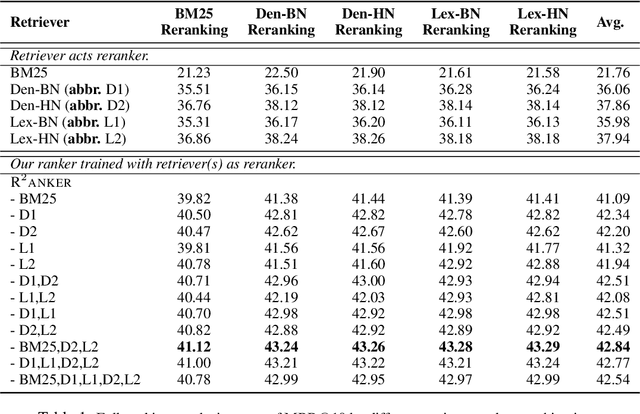
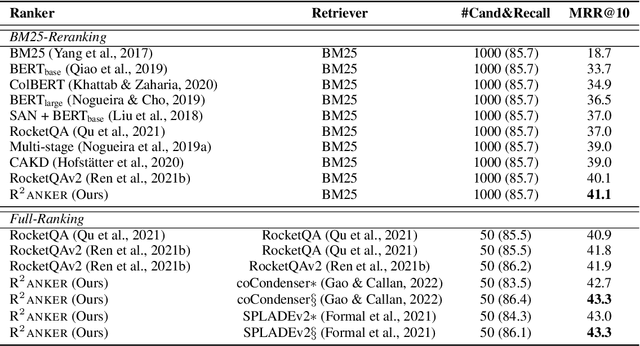
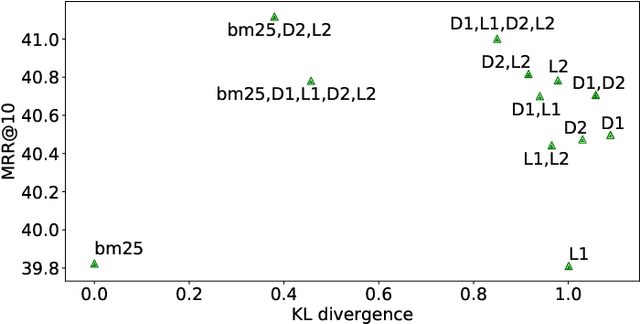
Abstract:A ranker plays an indispensable role in the de facto 'retrieval & rerank' pipeline, but its training still lags behind -- learning from moderate negatives or/and serving as an auxiliary module for a retriever. In this work, we first identify two major barriers to a robust ranker, i.e., inherent label noises caused by a well-trained retriever and non-ideal negatives sampled for a high-capable ranker. Thereby, we propose multiple retrievers as negative generators improve the ranker's robustness, where i) involving extensive out-of-distribution label noises renders the ranker against each noise distribution, and ii) diverse hard negatives from a joint distribution are relatively close to the ranker's negative distribution, leading to more challenging thus effective training. To evaluate our robust ranker (dubbed R$^2$anker), we conduct experiments in various settings on the popular passage retrieval benchmark, including BM25-reranking, full-ranking, retriever distillation, etc. The empirical results verify the new state-of-the-art effectiveness of our model.
FedNoiL: A Simple Two-Level Sampling Method for Federated Learning with Noisy Labels
May 20, 2022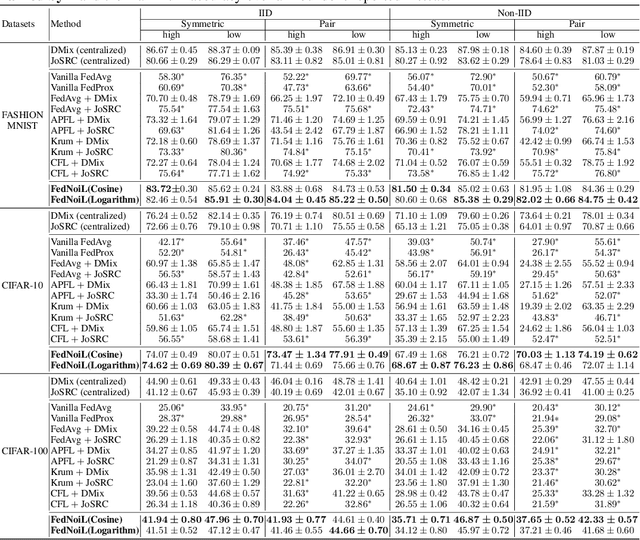

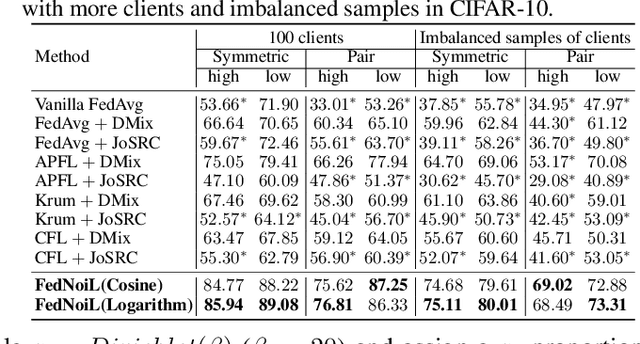

Abstract:Federated learning (FL) aims at training a global model on the server side while the training data are collected and located at the local devices. Hence, the labels in practice are usually annotated by clients of varying expertise or criteria and thus contain different amounts of noises. Local training on noisy labels can easily result in overfitting to noisy labels, which is devastating to the global model through aggregation. Although recent robust FL methods take malicious clients into account, they have not addressed local noisy labels on each device and the impact to the global model. In this paper, we develop a simple two-level sampling method "FedNoiL" that (1) selects clients for more robust global aggregation on the server; and (2) selects clean labels and correct pseudo-labels at the client end for more robust local training. The sampling probabilities are built upon clean label detection by the global model. Moreover, we investigate different schedules changing the local epochs between aggregations over the course of FL, which notably improves the communication and computation efficiency in noisy label setting. In experiments with homogeneous/heterogeneous data distributions and noise ratios, we observed that direct combinations of SOTA FL methods with SOTA noisy-label learning methods can easily fail but our method consistently achieves better and robust performance.
ClarET: Pre-training a Correlation-Aware Context-To-Event Transformer for Event-Centric Generation and Classification
Mar 09, 2022
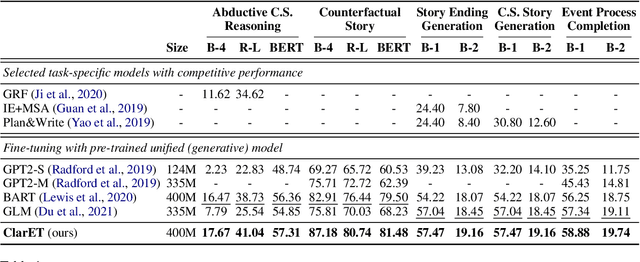
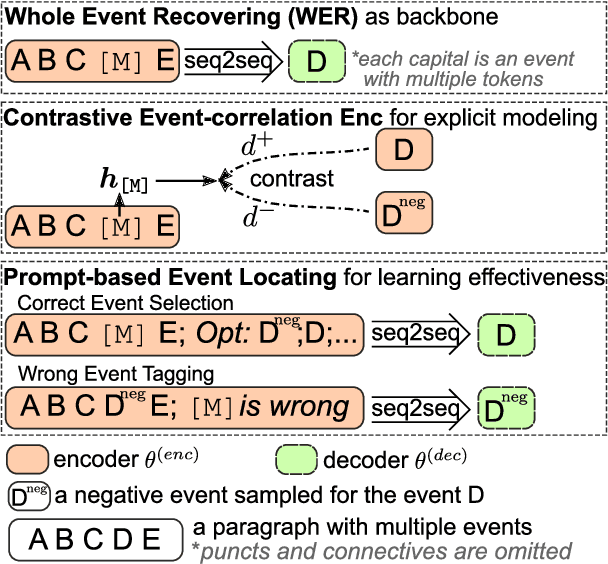
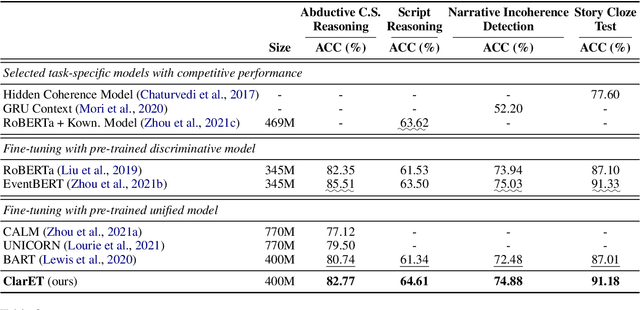
Abstract:Generating new events given context with correlated ones plays a crucial role in many event-centric reasoning tasks. Existing works either limit their scope to specific scenarios or overlook event-level correlations. In this paper, we propose to pre-train a general Correlation-aware context-to-Event Transformer (ClarET) for event-centric reasoning. To achieve this, we propose three novel event-centric objectives, i.e., whole event recovering, contrastive event-correlation encoding and prompt-based event locating, which highlight event-level correlations with effective training. The proposed ClarET is applicable to a wide range of event-centric reasoning scenarios, considering its versatility of (i) event-correlation types (e.g., causal, temporal, contrast), (ii) application formulations (i.e., generation and classification), and (iii) reasoning types (e.g., abductive, counterfactual and ending reasoning). Empirical fine-tuning results, as well as zero- and few-shot learning, on 9 benchmarks (5 generation and 4 classification tasks covering 4 reasoning types with diverse event correlations), verify its effectiveness and generalization ability.
 Add to Chrome
Add to Chrome Add to Firefox
Add to Firefox Add to Edge
Add to Edge